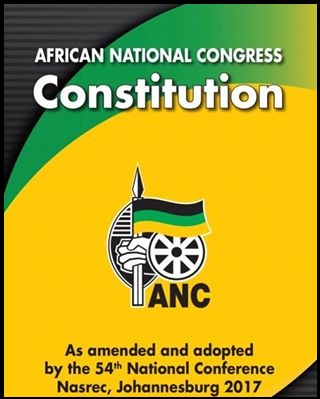The ANC is a national liberation movement. It was formed in 1912 to unite the African people and spearhead the struggle for fundamental political, social and economic change.
For ten decades the ANC has led the struggle against racism and oppression, organising mass resistance, mobilising the international community and taking up the armed struggle against apartheid.
The ANC achieved a decisive democratic breakthrough in the 1994 elections, where it was given a firm mandate to negotiate a new democratic Constitution for South Africa. The new Constitution was adopted in 1996.
The ANC was re-elected in 1999 to national and provincial government with an increased mandate.
The policies of the ANC are determined by its membership and its leadership is accountable to the membership.
Membership of the ANC is open to all South Africans above the age of 18 years, irrespective of race, colour and creed, who accept its principles, policies and programmes.
Aims and Objectives
The ANC`s key objective is the creation of a united, non-racial, non-sexist and democratic society.
This means the liberation of Africans in particular and black people in general from political and economic bondage.It means uplifting the quality of life of all South Africans, especially the poor.
The struggle to achieve this objective is called the National Democratic Revolution.
ANC Policy
The Freedom Charter, which was adopted by the Congress of the People in 1955, remains the basic policy document of the ANC.
The Freedom Charter declares that:
– The people shall govern
– All national groups shall have equal rights
– The people shall share in the country`s wealth
– The land shall be shared among those who work it
– All shall be equal before the law
– All shall enjoy equal human rights
– There shall be work and security
– The doors of learning and culture shall be opened
– There shall be houses, security and comfort
– There shall be peace and friendship
In 1994 the ANC adopted the Reconstruction and Development Programme (RDP) as the basic policy framework guiding the ANC in the transformation of South Africa. The key programmes of the RDP are:
– meeting basic needs
– developing our human resources
– building the economy
– democratising the state and society
Symbols of the ANC
The flag of the ANC is made of equal horizontal bands of black, green and gold. The black symbolises the people of South Africa who, for generations, have fought for freedom. The green represents the land, which sustained our people for centuries and from which they were removed by colonial and apartheid governments. The gold represents the mineral and other natural wealth of South Africa, which belongs to all its people, but which has been used to benefit only a small racial minority.
The logo contains a spear and shield to represent the early wars of resistance to colonial rule, the armed struggle of the ANC`s former armed wing, Umkhonto we Sizwe, and the ANC`s ongoing struggle against racial privilege and oppression. The wheel dates back to the campaign for the Congress of the People, which adopted the Freedom Charter, and marks the joining in a common struggle for freedom people from all South Africa`s communities. It is a symbol of the strong non-racial traditions of the ANC. The fist holding the spear represents the power of a people united in struggle for freedom and equality.
The ANC`s rallying call Amandla ngawethu or Matla ke arona means `power to the people`, reflecting the central demand of the Freedom Charter that the people shall govern. It a statement of the ANC`s commitment to build and deepen popular democracy and the active involvement of the people in the struggle to improve their lives
Responsibilities of an ANC member
The values and principles of an ANC member include:
humility and a selfless dedication to the struggle for a non-racial, non-sexist and democratic society,
concern for the will and interests of the people, captured in the principles of Batho Pele (people first)
a commitment to implement the policies of the movement and the decisions of the collective.
Members of the ANC are expected to:
belong to an ANC branch, pay subscription fees and assist in building the ANC,
participate actively in the discussion, formulation and implementation of ANC policy and programmes,
accept and defend the decisions of the relevant structures of the movement,
build the unity of the ANC and democratic movement and combat corruption, nepotism and factionalism,
fight against racism, tribal chauvinism, sexism, religious and political intolerance or any form of discrimination,
constantly remain informed of political and other developments, building their own capabilities as part of a process of life-long learning,
remain in touch with the people and play an active role in the affairs of the community,
behave in an exemplary way in day-to-day life, and not use positions of responsibility for self-enrichment or personal gain.
Structures of the ANC
The Branch is the basic unit of the ANC, where members participate in ANC activities and political discussions. The branch is the `vanguard` of the community, representing its interests, expressing its aspirations and mobilising it to work together for local development. Each branch elects a Branch Executive Committee at an Annual General Meeting.
The Regional Executive Committee (REC) is elected at a Regional Conference every two years by the representatives of the branches in the region.
The Provincial Executive Committee (PEC) is elected at a Provincial Conference every three years by the representatives of the branches in the province.
The National Executive Committee (NEC) is the highest organ of the ANC between Conferences and has the responsibility to lead the organisation. It is elected every five years at the National Conference. The NEC elects a National Working Committee (NWC) from within its ranks to coordinate the work of the organisation on a day-to-day basis.
The National Conference, which takes place every five years, is the highest decision-making body of the ANC. Branch representatives comprise at least 90 percent of voting delegates at the National Conference. A National General Council (NGC) is held between National Conferences to evaluate the programme of the movement.
The ANC Women`s League functions as an autonomous body within the overall structure of the ANC. Its objective is to defend and advance the rights of women against all forms of oppression and to ensure that women play a full role in the life of the organisation. The Women`s League is open to all women who are members of the ANC.
The ANC Youth League also functions as an autonomous body, with the objective of uniting and leading young people in confronting and dealing with the problems that face the youth, and in ensuring that the youth make a full and rich contribution to the work of the ANC. Membership of the Youth League is open to all people between the ages of 14 and 35.
The Tripartite Alliance
The ANC is in an alliance with the South African Communist Party(SACP) and the Congress of South African Trade Unions (COSATU). Each Alliance partner is an independent organisation with its own constitution, membership and programmes. The Alliance is founded on a common commitment to the objectives of the National Democratic Revolution, and the need to unite the largest possible cross-section of South Africans behind these objectives.
Where to find the ANC
Branches of the ANC are to be found in every city, town and village in South Africa. The ANC has a national headquarters, nine provincial offices and several regional offices.




